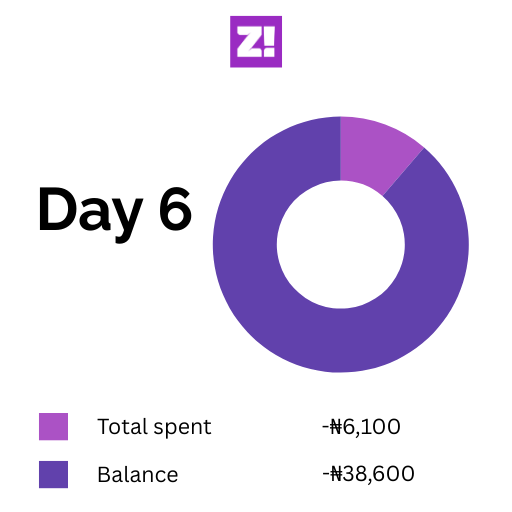
Since the Nigerian government announced the new ₦70,000 minimum wage, I’ve been curious: can anyone actually live on that amount for a full month in this economy?
I earn ₦250k monthly as an IT support specialist, and while it might sound okay on paper, it runs out faster than fuel during a subsidy rumour.
Typically, I spend 60% of my salary and stash the remaining 40% — ₦150k goes out most months, but sometimes my spending hits 70%. This April, I want to try something different: I’m limiting myself to spending just ₦70,000 for the entire month. Basically, I’m trying to live like someone earning minimum wage.
Can I make it through the month if I stick to a plan? That’s the question.

Day 1
It’s April 1st, and it’s the Eid-el-Fitr public holiday, so I’m not working. I stay at home to avoid spending unnecessarily. Then reality sets in — my new laptop is en route from Ibadan, and I need to pay the delivery driver.
I top up ₦1,500 for airtime, call the driver, and track my parcel. After confirming he’s close, I head to a POS near the bus park to get some cash. That’s another unexpected cost. The POS attendant tells me they charge ₦100 for every ₦5,000. I roll my eyes and hand over my card.
I withdraw ₦5,000 first, then later go back for another ₦3,000 to keep. That’s ₦8,200 gone in total and ₦200 of it is just for POS charges.
I pay the bus driver ₦5,000 to sort the waybill.

Day 2
I work remotely and only have to visit the office once a month, so I plan my days to avoid unnecessary spending. I rarely ever step out.
I keep my fridge stocked, line up my calls back-to-back so I’m not tempted to leave the house, and stay glued to the internet. It’s a simple formula: the less I step out, the less I spend.
After work, I withdraw ₦3,100 from a POS nearby for a bike ride to a supermarket, where I spend ₦10,500 on skincare essentials — Nivea body cream and Dove soap.
By 8:30, Barça is playing Madrid. They score, and Cowrywise yanks ₦1,000 from my account. It’s part of their “goal-based savings challenge” — an automated feature that deducts money every time my team scores. I signed up for it, and it stings, but it’s a disciplined kind of pain. They also take another ₦1,000 for my regular weekly savings plan.
The money is locked until January, so I can’t touch it. Since I never know how many goals Barça will score, I never really know how much I’ll end up saving. But so far, it’s worked.

Day 3
I didn’t spend a single kobo today.
There’s food in the kitchen, and I’m not going anywhere. I have a router set up, so data isn’t a problem either. I just sit at my desk, work, eat, and mind my business — a peaceful, no-spend kind of day.

Day 4
Same as yesterday — indoors, no spending. I’m starting to feel proud of myself.

Day 5
No movement again. No money spent. This might work.

Day 6
It’s Saturday, and I figure a quick haircut and a snack won’t break the bank — it should cost me ₦6,000 or less.
I recharge ₦500 airtime, withdraw ₦2,100 for transport, and head to the barbershop. A clean cut costs me ₦1,500, and I treat myself to two meat pies for ₦2,000.
I spend ₦6,100. The three-day no-spending streak is over.

Day 7
No movement = no spending. Simple math.

Day 8
I’m tired of home food. I order pounded yam with ogbono and fish. It slaps, but it also costs ₦7,250.

Day 9
Barça strikes again: four goals, and that’s ₦4,000 straight into my savings wallet. My regular weekly ₦1,000 savings hits too.
I know I’m not making it to the end of the month on ₦70k.

Day 10
It’s time for my monthly in-office appearance.
I book a business class train from Abeokuta to Lagos for ₦4,720. I also load ₦2,500 data for my MiFi and withdraw ₦5,000 cash to hold me.
I order a cab from Mobolaji Johnson Station in Yaba to my hotel in Surulere. It costs ₦3,000.
Luckily, my company covers food and accommodation for the next few days.

Day 11
I take another cab to work in Surulere for ₦2,200. I find out I could have trekked the distance. SMH.
I buy shawarma for ₦7,000 in the evening and recharge ₦1,000 airtime.

Day 12
No spending.
I stay in the office all day and enjoy free breakfast, lunch, and dinner. But I know I’m not on track anymore. I’ve already burnt through most of the ₦70k. At this point, I’m just trying to delay the inevitable.

Day 13
Sunday: the beginning of the end.
I miss my 4 p.m. train back to Ogun. I take a bus back to the hotel, which costs me ₦2,500. I also pay ₦48,000 to extend my stay for the night, and this isn’t covered by the company.
After I settled in, I book another train ticket for ₦4,720.
Barça scores again, which means another ₦1,000 deduction. Then, I renew my ₦2,500 weekly MiFi plan.

Day 14
I hail a cab to the station — it costs me ₦3,200. I catch the morning train this time, and once onboard, hunger kicks in. I spend ₦1,800 on meat pie and sausage rolls.
By 9:49 a.m., I arrive in Ogun and hop on a bike for the last stretch home. That’s another ₦500 gone.

Bottom Line
It’s just the 14th day of the month, and I’ve already blown way past the ₦70k minimum wage — and more than half my salary, too. If I were commuting to the office daily, I’d have spent much more.
I thought I could survive the month on Nigeria’s new minimum wage if I planned well enough. But in reality, even someone who earns ₦250k monthly can barely stretch that far.
Living in Nigeria right now isn’t just hard; it’s a full-time survival game.

Click here to join the waitlist for Zikoko’s first-ever money event!




